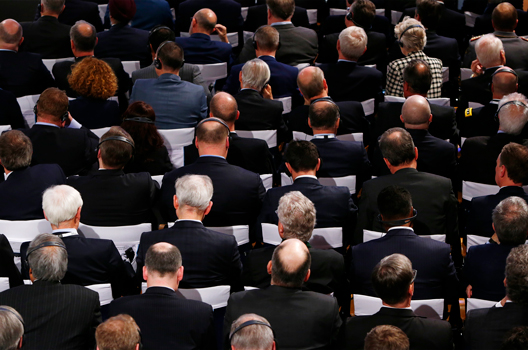 The annual Munich Security Conference (MSC) which kicks off today may be a veritable who’s who in global security, but the conference is far more than just hobnobbing among the nearly five hundred senior security and defense officials in attendance. Frequently the MSC has been a bellwether for things to come in the global security landscape. Speakers have also used the forum to make headlines that have echoed far beyond Munich. It was here in 2007 that Russia’s President Vladimir Putin publicly rejected the western-led international order and pushed back, hard, on NATO’s continued enlargement and US-led interventions in the Middle East and elsewhere.
The annual Munich Security Conference (MSC) which kicks off today may be a veritable who’s who in global security, but the conference is far more than just hobnobbing among the nearly five hundred senior security and defense officials in attendance. Frequently the MSC has been a bellwether for things to come in the global security landscape. Speakers have also used the forum to make headlines that have echoed far beyond Munich. It was here in 2007 that Russia’s President Vladimir Putin publicly rejected the western-led international order and pushed back, hard, on NATO’s continued enlargement and US-led interventions in the Middle East and elsewhere.
The 2018 Munich Security Conference opened on February 16 against a backdrop of a global order under increasing stress, both Russia and China challenging the international rules of the road, the possibility of another Korean War, continued turbulence in the Middle East, and uncertainty about the future of the US global role. There are also whispers about the return of great power war, something unthinkable just a few years ago. The title of this year’s Munich Security Conference report, released ahead of the event, perhaps put it best: To the Brink – and Back?
The Munich Security Conference is global in focus, but a central component has always been the dialogue between the United States and Europe about transatlantic security, and the role of the broader transatlantic community on the global stage.
In light of what has happened since the last MSC, there will be no shortage of items to discuss.
For starters, the administration of US President Donald J. Trump has recently released two key documents (the National Security Strategy and the National Defense Strategy) which hint at a United States posturing itself for great power competition with China and Russia. The National Defense Strategy in particular stresses the importance of US alliances, not least NATO, and the need for the United States and its allies to push back on Russian and Chinese military, political, and economic assertiveness. This should bring cheer to those in Europe who remain worried about Washington’s commitment to European security. Despite these positive indicators, concerns linger that the United States has lost interest in its role as leader of a rules-based international order, and instead views international relations and the world in far grittier and zero-sum terms.
European defense cooperation has gained new energy through the Permanent Structured Cooperation (PESCO) initiative. PESCO seeks to bring a range of European Union (EU) nations together to work on a menu of defense projects, ranging from military mobility across the continent to enhanced command and control and surveillance capabilities for all allies involved. This initiative is helped along by rising defense spending across Europe, along with the European Defense Fund created by the European Commission.
This should come as good news to Trump and his cabinet officials who have been outspoken about their expectations of NATO defense spending. However there are others in Washington have for years encouraged the Europeans to increase defense coordination in order to avoid duplication, stretch the value of every euro spent on defense, and ultimately bring more European capabilities to the field.
However, concern is now heard in Washington that PESCO may threaten the transatlantic link from the European side, and that US defense companies will face an uphill battle in competing on the future European defense market.
Speaking of defense spending, NATO Secretary General Jens Stoltenberg delivered further good news ahead of the conference. Non-US NATO defense spending grew by 5 percent in 2017, and now eight alliance members reach the NATO commitment to 2 percent of their gross domestic product (GDP) on defense. That number is expected to reach fifteen by 2024. While imperfect, the increasing commitments should significantly lessen US concerns about burden-sharing within NATO.
While there is plenty to discuss in terms of transatlantic security and the US-European relationship in Munich, wider geopolitical concerns will certainly feature in many conversations. There is a dawning recognition among defense officials that regardless of location, a political, economic, or security crisis—such as a war on the Korean peninsula—would have real consequences for Europe, too. Another example, the recent news that US strikes killed scores of Russian security contractors in Syria further highlights how war, crises, and webs of alliances can interact in unforeseeable ways.
Finally, let’s not forget about the internal challenges facing key members of the transatlantic community. The United States is a deeply divided country, with a government shut-down seemingly always around the corner. Germany has gone without a government for nearly four months. The United Kingdom faces continued uncertainty about Brexit and what a final deal with the EU would look like. Meanwhile, countries like Poland and Hungary are on a worrying trajectory away from liberal democracy.
Throughout the conference many will look to Munich for signals of where global security is headed, and not least about the future trajectory of European security and the transatlantic relationship. Many here in Munich hope that this will be the year that the world begins to step back from the brink, but far fewer are betting on it.
Magnus Nordenman is director of the Atlantic Council’s Transatlantic Security Initiative in the Scowcroft Center for Strategy and Security.
Image: A view of participants at the Munich Security Conference in Munich, Germany, February 16, 2018. (REUTERS/Michaela Rehle)
